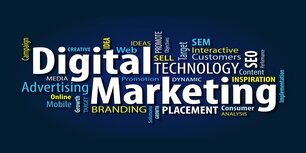Digital Marketing
In an era dominated by the internet and digital technology, traditional marketing methods are giving way to a more dynamic and measurable approach—digital marketing. This article delves into the realm of digital marketing, its significance, key strategies, and its transformative impact on businesses in the digital age.
Understanding Digital Marketing
Digital marketing encompasses all marketing efforts that utilize electronic devices and the internet. These efforts aim to connect with prospective customers where they spend much of their time: online. Unlike traditional marketing, digital marketing provides real-time analytics, enabling businesses to assess their marketing campaigns' effectiveness immediately. It's a versatile and cost-effective strategy for businesses of all sizes.
The Significance of Digital Marketing
The rapid growth of the internet and the increasing prevalence of smartphones have significantly altered consumer behavior. People turn to online channels for information, entertainment, and, most importantly, product research and purchases. This shift has made a compelling case for businesses to adopt digital marketing strategies to reach their target audience effectively. Here are some key reasons why digital marketing is significant:
1. Enhanced Visibility: Digital marketing enables businesses to establish a strong online presence. Through strategies like search engine optimization (SEO), content marketing, and social media marketing, companies can increase their visibility to potential customers.
2. Targeted Marketing: Digital marketing allows for precise audience targeting. Businesses can tailor their marketing efforts to reach the most relevant and interested consumers, improving conversion rates.
3. Cost-Effective: Compared to traditional advertising methods, digital marketing typically offers a more cost-effective way to promote products and services. It's accessible to businesses with varying budget sizes.
4. Real-Time Analytics: Digital marketing provides real-time data and analytics. Businesses can track the performance of their marketing campaigns instantly and make adjustments to improve results.
Key Digital Marketing Strategies
Effective digital marketing involves a combination of strategies tailored to a business's goals and target audience. Here are some core digital marketing strategies:
1. Search Engine Optimization (SEO): SEO aims to improve a website's visibility on search engines like Google. Optimized websites are more likely to appear in top search results when users look for related keywords.
2. Content Marketing: High-quality, relevant content attracts and engages an audience. Content marketing includes blog posts, articles, videos, infographics, and more.
3. Social Media Marketing: Businesses use social media platforms like Facebook, Twitter, and Instagram to engage with their audience, promote products, and build brand awareness.
4. Email Marketing: Email marketing campaigns deliver tailored messages directly to a subscriber's inbox. It's a highly effective method for nurturing leads and retaining customers.
5. Pay-Per-Click Advertising (PPC): PPC advertising allows businesses to place ads on search engines or social media platforms and pay a fee each time their ad is clicked. It's a quick way to attract traffic and increase conversions.
6. Affiliate Marketing: In this strategy, businesses collaborate with affiliates to promote their products or services. Affiliates earn a commission for each sale or lead they generate.
The Transformative Impact on Businesses
Digital marketing has had a transformative impact on businesses, regardless of their size or industry. It's reshaped the way companies reach and engage their audience and market their products. Here are some of the transformative effects of digital marketing:
1. Enhanced Customer Engagement: Digital marketing enables businesses to engage with customers in real time. Social media platforms, for instance, provide direct communication channels, allowing companies to respond to inquiries and build relationships with their audience.
2. Improved ROI: Digital marketing offers better cost-efficiency compared to traditional marketing. Digital advertising campaigns can be precisely measured and optimized for maximum ROI.
3. Global Reach: The internet provides a global stage for businesses. Even small companies can reach a vast international audience, expanding their market reach.
4. Personalized Marketing: With the abundance of data available, digital marketing strategies can be highly personalized. Businesses can tailor their marketing to individual preferences, making their efforts more effective.
5. Data-Driven Decision Making: Digital marketing provides a wealth of data and analytics that inform strategic decisions. Companies can continuously refine their marketing strategies based on real-time results.
Conclusion
In today's digital age, digital marketing is not merely an option but a necessity for businesses seeking to thrive and remain competitive. It offers cost-effective methods to enhance visibility, engage customers, and measure results. Embracing digital marketing is a strategic move toward achieving business goals and building lasting connections with an ever-evolving online audience.
As you embark on your digital marketing journey, remember that the digital landscape is dynamic. Adapting to the latest trends and technologies is key to sustained success. By staying informed and implementing effective digital marketing strategies, businesses can harness the power of the digital age to achieve their objectives and reach new heights.

